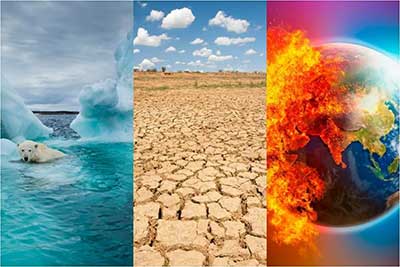Date : 14/08/2023
Relevance – GS Paper 3 – Environment – Climate Change
Keywords – Germanwatch, Net zero, Climate risks, carbon neutrality
Context -
In the year 2022, India faced the wrath of extreme weather events on a staggering 314 out of 365 days, leaving a profound impact on the nation's socio-economic fabric. A recent analysis, titled "Still Unprepared," conducted by the Bengaluru-based think tank Climate Risk Horizons, has shed light on a critical issue: despite the escalating impacts of climate change, major Indian banks remain ill-equipped to confront climate risks effectively.
This assessment, which focuses on the climate preparedness of India's 34 largest banks, possessing a combined market capitalization of Rs 29.5 trillion, highlights significant gaps in measuring, managing, and mitigating climate-related risks.
Growing Climate Challenges and Financial Implications:
The escalating frequency and intensity of floods, heatwaves, and other extreme events are imposing a heavy financial toll on India. Head of Sustainable Finance for Climate Risk Horizons underscores the gravity of the situation by emphasizing that the repercussions of these events are not confined to ecological concerns alone; they bear real financial consequences for the Indian economy and its investors.
India's Standing in Global Climate Losses:
Highlighting India's vulnerability to climate change, a 2021 report from Germanwatch revealed that the nation led in terms of financial losses attributed to climate change. Although India's position has shifted to second after China when considering cumulative financial losses from 2000 to 2019, it underscores the critical nature of addressing climate-related risks in the country's financial sector.
Banking Sector's Unpreparedness:
Despite the pressing need to address climate risks, the report reveals that Indian banks, both public and private, lack a comprehensive policy and implementation plan concerning climate-focused funding. A senior official from a Kolkata-based bank acknowledges this shortcoming, stressing that banks have yet to adopt a clear stance on funding climate-related initiatives.
Assessment Criteria and Banking Sector Performance:
The Climate Risk Horizons analysis evaluates the climate preparedness of major banks based on criteria such as fossil fuel exclusion policies, emissions disclosure, climate scenario analysis, and Net Zero Targets. Notably, Yes Bank, HDFC Bank, and Axis Bank emerge as the top performers in climate-risk preparedness. However, despite progress, none of the banks have conducted climate-related scenario analyses, a critical step in understanding and addressing potential risks.
What is Net Zero Targets –
Termed as carbon neutrality, this concept does not entail reducing a nation's emissions to absolute zero. Instead, it represents a condition where a country's emissions are counterbalanced through the uptake and elimination of greenhouse gasses from the air. This equilibrium can be augmented by expanding carbon sinks, such as forests, which aid in absorbing emissions. Furthermore, the extraction of gasses from the atmosphere necessitates advanced technologies like carbon capture and storage.
Over 70 nations have committed to achieving Net Zero status by the mid-century, specifically by 2050. India has pledged to curtail its emissions to net zero by 2070, as articulated during the 26th Conference of Parties (COP) summit.
Public Banks and Energy Transition:
The report highlights the insufficient commitment of public banks to finance India's crucial energy transition, a linchpin of the nation's climate policy. Shockingly, public sector banks contribute less than eight percent of total financing for the renewable energy sector, despite the urgency of transitioning away from carbon-intensive industries. This misalignment with the Reserve Bank of India's (RBI) recognition of climate risks as systemic threats to the Indian economy underlines the gravity of the situation.
Need for Regulatory Framework and Urgent Actions:
Amid the dearth of climate-focused initiatives, experts emphasize the urgent need for mandatory guidelines from the RBI regarding climate-related disclosures and standardized frameworks for managing climate risks. Notably, State Bank of India (SBI) and HDFC Bank have the highest exposure to carbon-intensive sectors, with SBI's exposure primarily dominated by coal investments. Despite the RBI releasing a draft discussion paper on climate risk over a year ago, no concrete steps have been taken thus far.
Steps for Improved Preparedness:
Experts emphasize several critical steps for banks to enhance their climate preparedness. These include proactive disclosure of green finance initiatives, adoption of a standardized reporting format, the formulation of transition plans for fossil fuel financing, and the implementation of tools like climate scenario analyses. They note that Indian banks must align their operations with the nation's climate goals and support both climate-friendly projects and those affected by climate change-induced damages.
Conclusion:
The urgent need to address climate risks in India's banking sector cannot be overstated. With extreme weather events exerting mounting pressure on the nation's economy and the recognition of climate risks as systemic threats by the RBI, the banking industry must step up its efforts to mitigate and manage climate-related risks. By embracing sustainable practices, disclosing emissions, and investing in climate-friendly projects, banks can play a pivotal role in India's journey towards a more resilient and sustainable future.
Probable Questions for UPSC Mains Exam –
- Question 1: Discuss the findings of the Climate Risk Horizons analysis on the climate preparedness of major Indian banks. How does the unpreparedness of the banking sector to address climate risks impact the Indian economy? Propose measures to enhance the climate resilience of India's banking sector. (10 marks, 150 words)
- Question 2: Explain the concept of Net Zero Targets and its relevance in combating climate change. Evaluate India's commitment to achieving Net Zero by 2070 in comparison to global pledges. Highlight the challenges and opportunities associated with realizing this goal in the Indian context. (15 marks, 250 words)
Source – Down to Earth






















